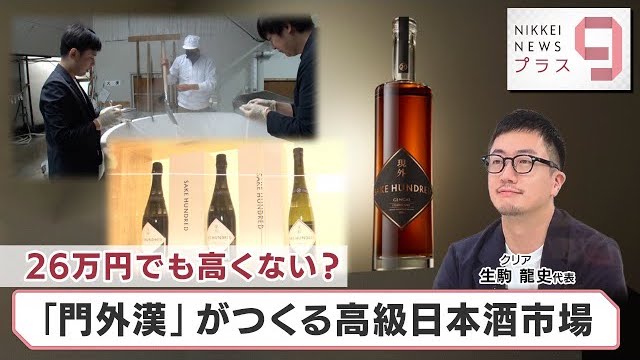TOKYO, Jul 01 (News On Japan) - In the world of Japanese sake, luxury brands with prices ranging from tens of thousands to hundreds of thousands of yen are gaining prominence. The driving force behind this trend is startups led by individuals with experience in IT. These outsiders are challenging the high-end sake market using a fabless manufacturing approach, where they don't own the production facilities.

At Shibuya Mark City in Tokyo, a store that offers around 2,000 types of sake is currently highlighting a brand called Sake Hundred. Among its lineup, the "Hikari" variety is priced at approximately 40,000 yen, while the sparkling sake "Byakko" costs 30,000 yen. These high-priced products are rarely available online, making their physical presence in stores highly appreciated by customers, including tourists who buy them as souvenirs.
The startup behind Sake Hundred, which does not own production facilities. CEO Ikoma explains that they delegate sake production to partner breweries across Japan. Clear's role is to design the concept and flavor of the sake, which is then manufactured by the breweries.
In Kumamoto, Clear's manufacturing manager Kawase regularly visits partner breweries to fine-tune the taste. By collaborating closely with brewers, they aim to produce even better sake. Kawase emphasizes that their process involves frequent consultations to ensure the feasibility and quality of their products.
Clear's founder, Komasa, entered the sake industry after working in IT and starting a sake-focused media outlet in 2014. In 2018, he launched the Sake Hundred brand. Komasa's passion for sake and frustration with the industry's economic challenges led him to create a brand that bridges this gap, ensuring that both the product's appeal and the breweries' profitability are enhanced.
Clear collaborates with various breweries instead of owning one to stimulate the entire sake industry. By creating a brand that collectively benefits multiple breweries, they aim to generate substantial revenue and ensure sustainable growth.
Although Clear does not disclose detailed sales figures, their goal is to achieve 10 billion yen in revenue within five years. Despite the declining domestic consumption of sake since its peak in 1973, Clear is optimistic about the growing export market driven by the global popularity of Japanese cuisine.
Komasa believes that creating high-value sake is essential in today's market. He argues that it's unrealistic to expect consumers to drink four times more sake than before. Instead, the focus should be on producing sake that consumers are willing to buy at higher prices, thereby adding value to the product.
Clear's strategy includes creating a sense of aspiration for their brand among younger generations. They aim to position their sake as a luxury item that people aspire to own, similar to high-end fashion brands.
Despite the high prices, Clear's products attract both sake enthusiasts and novices. By continually improving their offerings and expanding their lineup, they strive to cater to a diverse range of consumers' preferences and lifestyles.
Source: テレ東BIZ















